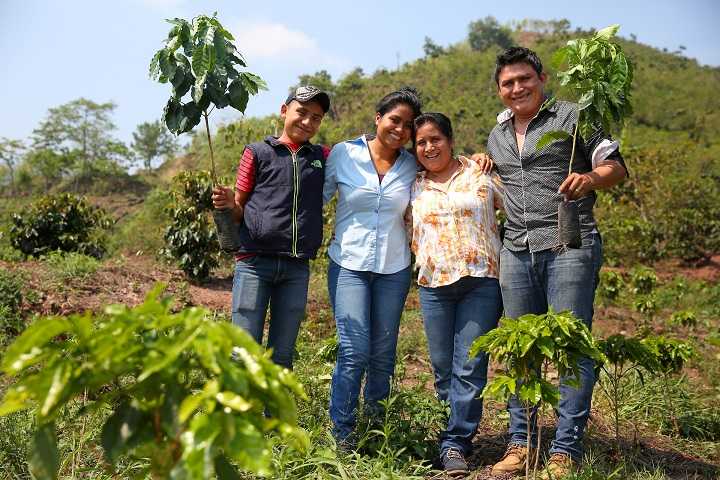SEATTLE, U.S. — In response to critically low coffee prices in Central America, Starbucks announced today a commitment of up to $20 million to temporarily relieve impacted smallholder farmers with whom Starbucks does business, until the coffee market self-corrects and rises above the cost of production.
These funds will go directly to smallholder farmers in Nicaragua, Guatemala, Mexico and El Salvador to subsidize farmer income during the upcoming harvest season in Central America.
“A majority of the coffee we purchase comes from smallholder farmers and the coffee crisis in Central America related to low prices cannot be ignored,” said Michelle Burns, senior vice president, Global Coffee and Tea. “We have a role and responsibility in helping smallholder farmers sustain their livelihoods. Their success will help ensure the long-term health of coffee productivity.”
“We have been severely affected by the recent price decline in the futures market. With today’s prices I can’t invest in my farm, in fact, I can barely cover labor costs. With these prices, my farm is just not profitable,” said Pedro Rosales Ubeda, Villa Nueva farm owner in Nicaragua. “Through Starbucks initiative I could receive a higher price for my coffee, cover my expenses and make a profit. This means I could provide better conditions to coffee pickers and their families. Also, this will allow me to invest more in my farm, be more productive and offer a better-quality coffee.”
“The National Coffee Association commends Starbucks for this important initiative to support coffee farmers, which is especially timely given that a rising supply of coffee has been impacting prices,” said Bill Murray, President and CEO, National Coffee Association, USA.
“We have seen firsthand the effects of these historically low coffee prices on smallholder farmers,” said Ric Rhinehart, executive director of the Specialty Coffee Association of America. “It will be through the strong support of the coffee industry and its leading companies, large and small, that we can set the stage for a viable coffee future, letting the farmers know their investment cost in upcoming crops will be compensated, providing them with much needed stability in the industry.”
20 Million Healthy Trees to Colombia
Additionally, Starbucks will expand its existing 100 Million Tree donation program and partner with The Colombian Coffee Growers Federation to supply 20 million coffee trees, technical support and supplies over the next two years to smallholder farmers in Colombia.
The seedlings will replace trees that are declining in productivity due to age and diseases like coffee leaf rust. This incremental investment is in line with the ongoing support Starbucks provides to coffee farmers and their communities, including access to $50 million toward low-interest-rate loans to smallholder farmers to support reinvestment in coffee and to advance more sustainable practices.
“We must strive for the economic sustainability of coffee producers,” said Francisco Santos, Ambassador of Colombia to the U.S. “We thank Starbucks for contributing to reforestation efforts in coffee-growing areas, working with the Colombian Coffee Growers Federation and deepening the alliance between the two organizations.”
“The coffee we drink depends on the well-being of 25 million coffee farmers, and right now – with coffee prices below the cost of production – farmers are in trouble,” said Bambi Semroc, who leads the Sustainable Coffee Challenge, in partnership with Starbucks, and serves as Vice President of Sustainable Markets and Strategy at Conservation International. “Without stable livelihoods, farmers can’t invest in their farms or in protecting the nature coffee depends on for its future. This fund, aimed directly at the most vulnerable farmers, is an industry first – and represents the bold actions we need more of to make coffee truly socially, environmentally and economically sustainable.”
Serving Ethically Sourced Sustainable Coffee
Starbucks has achieved 99% ethically sourced coffee and is working to make coffee the world’s first sustainable agricultural product by collaborating with others. For more than 46 years, Starbucks has supported farmers through investments and commitments including a 20-year partnership with Conservation International to develop C.A.F.E. Practices, the company’s sustainable coffee buying practices program that rewards coffee supply chains through strategic premiums for quality, social responsibility, environmental performance and economic transparency.
Additionally, through the Starbucks Foundation, the company supports the empowerment and economic opportunity of more than 250,000 women throughout our supply chains.
Starbucks has built a network of nine farmer support centers around the world to train farmers on the best agronomy practices as well as invested in open-source research and development at Hacienda Alsacia, the company’s farm in Costa Rica.
This open-source research is available to help ensure the future of coffee is strengthened by supporting new coffee varietals that are more rust resilient, while preserving high quality and increasing productivity.















